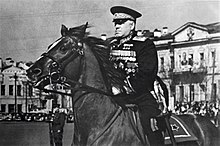Konstantin Rokossovsky
Soviet and Polish military commander (1896-1968)
Konstantin Konstantinovich Rokossovskiy (December 21, 1896 – August 3, 1968) was a Soviet military commander and Polish Defence Minister, best known for his prominent role in planning and executing Operation Bagration in summer 1944. He died in August 1968, aged 74, and lies buried in the Kremlin Wall Necropolis on Red Square.


| This article about a political figure is a stub. You can help Wikiquote by expanding it. |
Quotes
- Has a strong will. Decisive and firm. Often demonstrates initiative and skillfully applies it. Disciplined. Demanding and persistent in his demands. A somewhat ungracious and not sufficiently sympathetic person. Rather stubborn. Painfully proud. In professional terms well trained. Broadly experienced as a military leader... Absolutely cannot be used in staff or teaching jobs because constitutionally he hates them.
- Assessment of Georgy Zhukov, as quoted by Andreĭ Afanas'evich Kokoshin,Soviet Strategic Thought, 1917–1991 (1998): MIT Press, p. 43.
- The German army is a machine, and machines can be broken!
- Quoted in "Current Biography" - Page 562 - by H.W. Wilson Company - 1945
- In Russia, they say I'm a Pole, in Poland they call me Russian.
- Quoted in "Rokossowski - How Much of a Pole? - by Wiesław Białkowski, 1994.
- The troops of the Don Front at 4pm on February 2nd, 1943 completed the rout and destruction of the encircled group of enemy forces in Stalingrad. Twenty-two divisions have been destroyed or taken prisoner.
- February 1943. Quoted in "Russia at War, 1941-1945" - Page 543 - by Alexander Werth - 1964
- I have been placed under surveillance, and I can't take a step without it being known to the Polish minister of internal affairs.
- Quoted in "Memoirs of Nikita Khrushchev" - by Nikita Sergeevich Khrushchev - Heads of state - 2007
- I am a citizen of the Soviet Union and I think sharp measures need to be taken against anti-Soviet forces that are trying to make their way into the leadership. In addition, it is vitally important to maintain the lines of communication with Germany through Poland.
- Quoted in "Memoirs of Nikita Khrushchev" - by Nikita Sergeevich Khrushchev - Heads of state - 2007
Quotes about Konstantin Rokossovsky
- The policy of large-scale repression against military cadres led also to undermined military discipline, because for several years officers of all ranks and even soldiers in Party and Komsomol cells were taught to “unmask” their superiors as hidden enemies.
- It is natural that this caused a negative influence on the state of military discipline in the initial stage of the war.
- And, as you know, we had before the war excellent military cadres which were unquestionably loyal to the Party and to the Fatherland. Suffice it to say that those of them who managed to survive, despite severe tortures to which they were subjected in the prisons, have from the first war days shown themselves real patriots and heroically fought for the glory of the Fatherland. I have here in mind such [generals] as: [Konstantin] Rokossovsky..."
- Nikita Khrushchev -- February 24 1956[1]
- Rokossovsky was a different type of general from Zhukov. Although a good soldier, he was not exceptionally brilliant.
- Boris I. Nicolaevsky
- He was tall, blond and handsome, every inch the dashing half-Polish cavalry officer.
- Anthony Read
- Rokossovsky was an imposing figure, tall, very good-looking, and well dressed; I understand he was a bachelor and was much admired by ladies.
- Field Marshal Bernard Montgomery, as quoted in The Memoirs of Field Marshal Montgomery
- The engagements in which Zhukov won his reputation were so massive that, inevitably, many outstanding Soviet military men were involved- either under Zhukov's command or in coordinated and associated movements. There was then, and there continued for years to be, a raging competition for military glory in these engagements. Deep lines of political cleavage and quarrels also underlay the military disputes. Not only military glory was involved; political intrigue, intra-Party quarrels, high-level Kremlin politics were at issue. The principal military rivals of Zhukov were his fellow marshals, Ivan S. Konev, Rodion Malinovsky, V. I. Chuikov, A. I. Yeremenko, Semyon Timonshenko, and to a lesser extent men like K. K. Rokossovsky, V. D. Sokolovsky, and the staff chiefs, A. M. Vasilevsky, Boris Shaposhnikov and, later on, S. M. Shtemenko. Rivals of a different category were Stalin's cronies, men like Voroshilov and Budenny, and police generals such as L. Z. Mekhlis and G. I. Kulik.
- Harrison E. Salisbury (editor), Introduction to Marshal Zhukov's Greatest Battles (New York: Harper & Row, 1969) by Georgy Zhukov, translated from Russian by Theodore Shabad, p. 14-15
- I have no Suvorov, but Rokossovsky is my Bagration.
- Joseph Stalin
References
- ↑ Khruschev, Nikita. Speech to 20th Congress of the C.P.S.U..